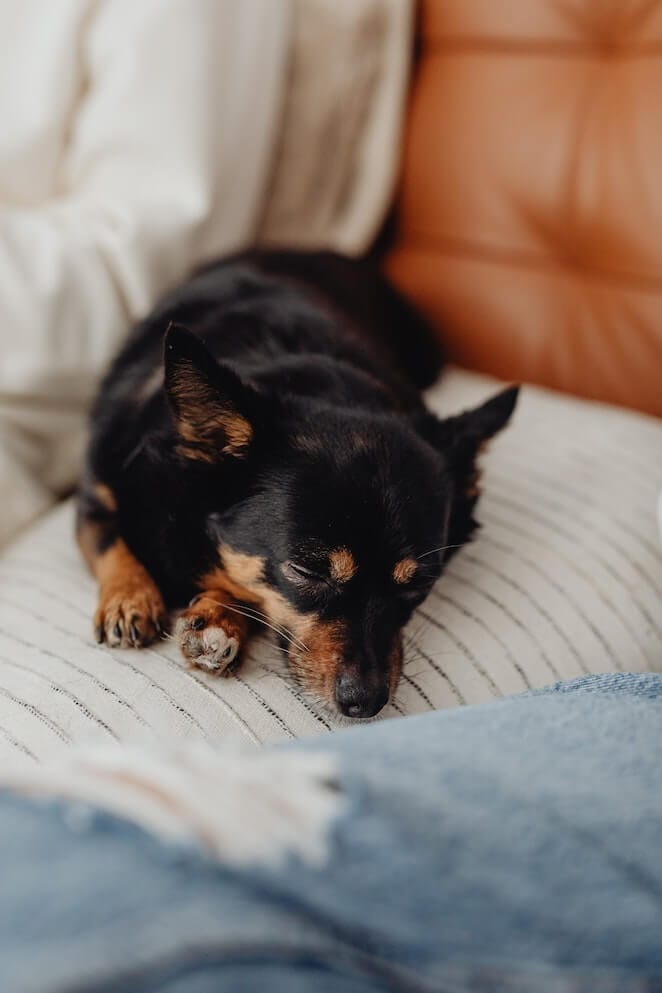
Dogs are more than just our furry best friends – they’re full of fascinating facts and traits that make them much more interesting than we give them credit for.
We have compiled some interesting facts about dogs sleep that you must check out if you have a dog or are planning to buy one.
Dogs are very adept at catching the right amount of Zs to recharge their batteries and stay alert when it matters most; this could even be considered an evolutionary superpower!
But why do dogs need so much rest anyway? Well, some experts believe it’s because their brains are constantly navigating the smells and sounds in their environment, which takes a lot of energy.
Let’s find out some more trivia on the dog snoozes.
Fascinating Facts about Dogs Sleep

Fact#1. Dogs don’t always need 8 hours of sleep. Some breeds can get away with 6 hours, while working dogs may require up to 12 or more.
Fact#2. A dog’s sleeping position can tell you how comfortable he is in his environment. On his back means he feels relaxed and secure, while curled up in a ball indicates anxiety or distress.
Fact#3. On average, a dog will spend 50% of their life asleep; this increases to 66% when they are elderly.
Fact#4. Some dogs snore when they sleep, usually due to their anatomy or excess weight.
Fact#5. Dogs can enter light and deep sleep just like humans do. But their REM (Rapid Eye Movement) cycles are much shorter.
Fact#6. A dog’s sleeping habits can be changed through training, just like any other behavior. For example, if your pup wants to sleep in bed with you every night, it’s best to set a firm rule that he sleeps on his own bed instead.
Fact#7. Dogs are most active during twilight hours (dusk and dawn), which is why they often bark at these times!
Fact#8. If your dog sleeps more than usual during the day, this could be a sign that he’s not getting enough exercise as recommended for his age and breed.
Fact#9. Dogs also dream about a lot of things, like running in the garden and other things they love.
Fact#10. Dogs are den animals and like to have a cozy spot to rest. You can help make this happen by providing them with a comfortable bed or crate in a quiet area of the home.
Fact#11. If your pup has an accident while sleeping, it may be due to dreaming. When they enter REM sleep, their muscles relax, and bladder control is impaired.
Fact#12. Some breeds of dogs tend to sleep more than others. For example, golden retrievers usually need up to 12 hours of sleep per day!
Fact#13. Just like humans, dogs need some form of physical and mental stimulation during the day in order to stay awake. Otherwise, they’ll sleep through it.
Fact#14. Certain smells can help promote better sleep in dogs. Lavender is especially effective for its calming effects on the nervous system.
Fact#15. Interestingly, dogs spend more time in deep sleep than humans do. This is because they need to be able to react quickly when predators or danger approaches.
Fact#16. Puppies tend to have shorter sleeping periods throughout the day than adult dogs due to their high energy levels and rapidly developing brains that require lots of rest for healthy growth and development.
Fact#17. Senior dogs may also require more frequent naps than younger adults. This is due to age-related health issues like arthritis, organ failure, and vision problems impeding on their ability to stay awake for longer periods at a time.

Fact#18. Greyhounds have a unique sleeping pattern in which they can rest for up to 18 hours per day!
Fact#19. Dogs, like humans, may experience nightmares or night terrors. Some signs that a dog is having nightmares include whimpering, yelping, twitching, or thrashing while asleep; they may also run around the house before settling back down again.
Fact#20. Dogs may use their owners’ beds as a safe haven or bedding material, as they feel comforted being around the scent and presence of someone they trust.
Fact#21. Some dogs can develop sleeping problems such as insomnia if they are over-excited or anxious during the day; it is important to create an environment where your dog feels calm and relaxed in order for them to get some quality sleep throughout the night.
Fact#22. Large breed dogs tend to sleep for longer periods than small breeds due to their size and lower energy levels.
Fact#23. It is not uncommon for a dog to have a favorite spot in which it prefers to take its naps; this could be on its own bed, your lap, or even your couch!
Fact#24. Dogs can be trained to sleep in their kennel when it is time for bed, but make sure that the kennel is comfortable and not too restrictive as this could cause stress and anxiety for your pup.
Fact#25. Just like humans, dogs can become sleep-deprived if they do not have adequate rest throughout the day; signs that a dog needs more shut-eye include yawning, droopy eyes, and an overall lack of energy.
Final Words

As you can see, all dogs have different sleep needs and habits – understanding these is key to ensuring your pup gets the rest he needs.
With the right information and a little bit of patience, you can help your four-legged friend enjoy a good night’s sleep every time!
Remember to always talk to a vet if your dog is having issues with his sleep and ensure he gets enough physical activity during the day.
Now go give your furry friend some cuddles and get ready for a good night’s rest! Sweet Dreams!
- 7 Dog Breeds With Webbed Feet And Why Do They Have Them - July 19, 2023
- 10 Best Fish For Small Tanks That Make Perfect Pets - July 18, 2023
- How to Breed Guinea Pigs: A Detailed Guide - July 17, 2023


GIPHY App Key not set. Please check settings